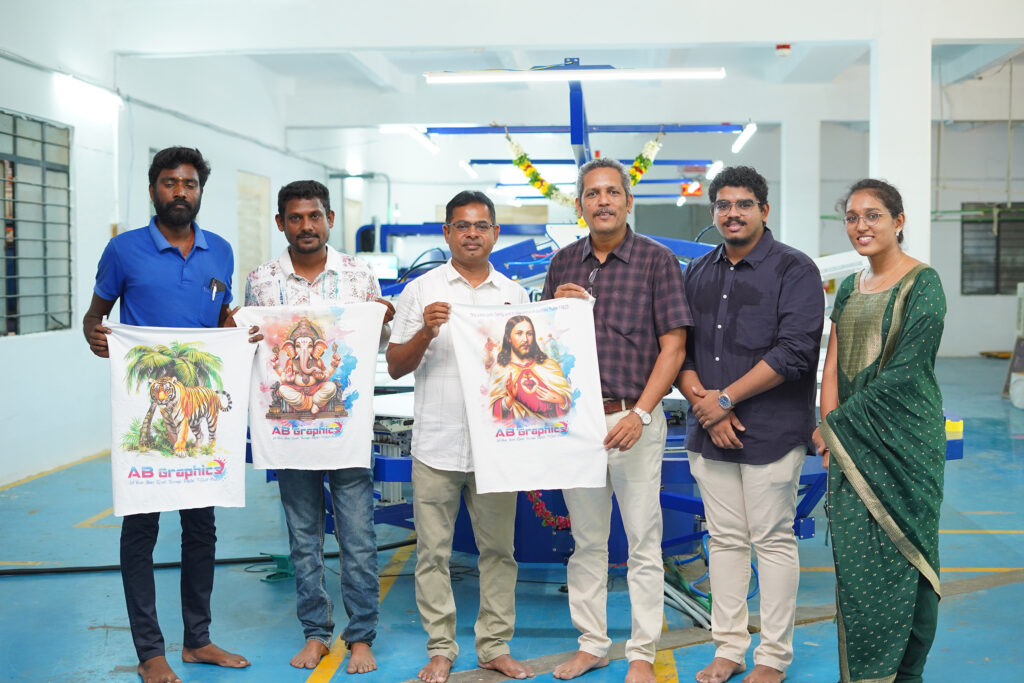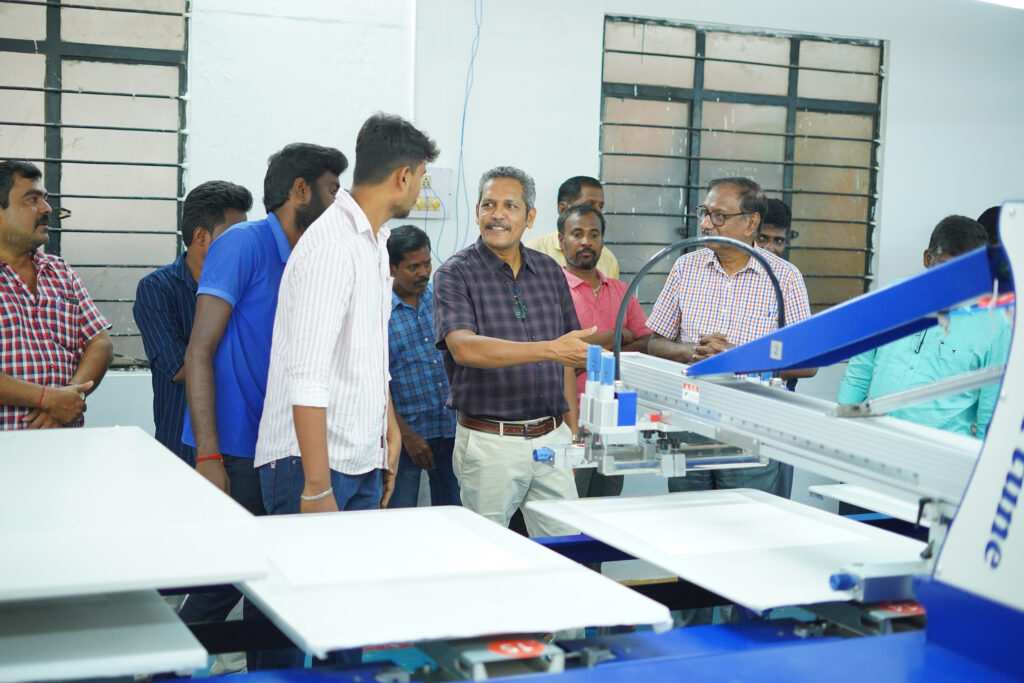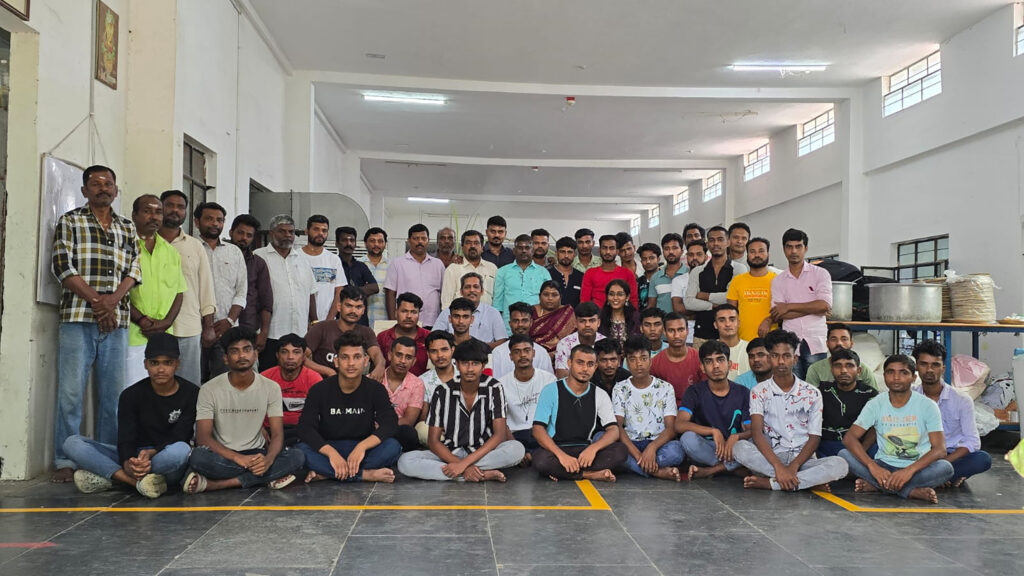AB Screens, a leading Tiruppur apparel printer, shares its journey with Graeme Richardson-Locke, FESPA’s Head of Associations & Technical Lead about how they are adapting to global export demands and evolving EU sustainability rules like the Digital Product Passport. Owner Suresh Babu emphasises quality, trust, and proactive sustainable management, including ZLD water treatment and solar power. The company uses hybrid digital/screen printing to offer speed, flexibility, and compliance, proving innovation combined with strong values drives success.
When I arrived in Tiruppur, Tamil Nadu, the heart of India’s knitted textile manufacturing cluster I was met by noise, a riot of colour and a traffic system that to a visitor feels unnerving and chaotic until you settle into its rhythm. I was in Tiruppur to present at an event organised by FESPA’s Indian association member, SPAI on the changing EU expectations for printed clothing sustainability. The upcoming EU Digital Product Passport is one of many new mechanisms for disclosure and transparency across international supply chains exporting to the EU. As Tiruppur exports 60% of its production to the EU (30% to US) it will need to respond to maturing sustainable management whose intention is to reduce misleading information reaching consumers.
I was grateful for the time I got to spend with key print professionals like Mr Shrikanth from TEKPA (Tiruppur Export Printers Association) and a talented group of printers and apparel manufacturers from this 600,000-employee textile city. For context there are around 5,000 textile printing presses within its 8,500 factories.

During my time I was pleased to meet Suresh Babu, the thoughtful and soft-spoken owner of AB Screens, whose easy-going approach and enthusiasm for his craft were infectious. Our conversation started with him reminiscing about being a double Gold FESPA Award winner in 2013 in London.
For more than twenty years, AB Screens led by Babu has been part of Tiruppur’s evolution from a regional production centre into a leading textile printing and manufacturing cluster. His company, AB Screens, now employs over 150 people and produces up to half a million printed garments each month for export to Europe, the USA, and the Middle East. Yet when he speaks about his success, it’s clear that growth alone isn’t what motivates him. “Our work has always been about quality, integrity, and customer trust,” he told me, “Because those values last longer than any order.”
Balancing international demand and local realities
Like many exporters, Babu faces a complex mix of rising material costs, high freight prices, and increasing international compliance requirements. But instead of seeing these pressures as obstacles, he treats them as drivers for improvement. “We’ve built dedicated quality-control teams for each region,” he explained, “so customers in Europe, the US, and the Middle East all receive the same reliability and finish.”
That commitment to quality is one reason the company has developed long-lasting relationships with buyers across continents. While some competitors chase the lowest price, Babu focuses on consistent quality and clear communication — qualities that keep customers coming back even in tough market conditions.
Sustainable management processes are part of responsible business practice
Sustainability isn’t a side project at AB Screens; it’s an integral part of our management and quality systems. The company uses solar PV to meet its energy needs, printing exclusively with water-based inks, and runs a Zero Liquid Discharge (ZLD) plant to ensure no wastewater leaves the facility. These are significant investments for a medium-sized manufacturer, but Babu sees them as essential for long-term resilience. The Tiruppur textile cluster has made a great deal of progress over recent years, for example it has reduced water consumption in processing by as much as 80% over 20 years, now produces a surplus of 1,800 Mw of energy back to the grid through solar and draws post-consumer PET waste from other states to be recycled in rPET apparel.
“Sustainability isn’t just about following rules, it’s about managing resources and costs to build a future that can support our employees, our customers and the reduce environmental impact.”
The payoff has been tangible, AB Screens has lowered utility costs, reduced waste, and has built a stronger reputation with international clients who increasingly insist on greater reporting and transparency around their order production.
Negotiating developing EU rules
With Europe establishing frameworks like the Digital Product Passport (DPP) and strengthening accountability through the Corporate Sustainability Due Diligence (CS3D), Babu’s proactive approach places the company ahead of the competition. His team has already implemented traceability systems that track materials through the supply chain, while all fabrics and inks meet GOTS, REACH, and OEKO-TEX certification standards.

He’s also begun sharing digital sustainability data with clients, a step towards the kind of transparency European buyers will soon require by law. Yet he acknowledges that for smaller companies, adapting to these regulations can be daunting. “We’d benefit from clearer, more practical guidance,” he said. “If brands, associations and organisations like FESPA can provide guides and easy-to-use platforms, factories like ours can comply faster and more accurately.”
Creativity meets conscience
While regulation shapes one side of the business, creativity always drives the other. Babu has observed global fashion preferences shifting toward sustainable materials, personalised designs, and short-run orders. “Customers want individuality,” he said. “Many are showing concern about how things are made, not only how they look.”
It is of course worth bearing in mind that fast fashion from Shein and Teemu represent a very different reality that will be challenged by many EU laws and directives as they are implemented. The process of achieving the right balance of affordability and sustainability will require legislative and consumer co-operation that are in their infancy in many markets.
However, and on a positive note AB Screens reflect that their response has made digital printing indispensable alongside screen printing. Bubu has invested heavily in hybrid technology that blends the creative potential of screen printing with the precision and flexibility of digital inkjet systems. “Combining both techniques lets us create complex, multi-colour designs efficiently,” he explained. “It keeps costs manageable and supports smaller batch production, a perfect balance between artistry and practicality.”
Adapting to faster fashion
One clear benefit of the digitalisation is speed to market. Babu’s production lines have evolved from fulfilling tens of thousands of identical pieces to delivering hundreds of customised ones, often within days. Minimum order quantities that once hovered around 10,000 garments are now as low as 500. “Demand for smaller, faster runs is growing everywhere,” he noted. “It’s a challenge operationally, but it keeps us agile and responsive.”
His design studio is staffed by experienced artists (inspired by his own legacy as a very talented artist) with more than two decades in the industry, has become a key differentiator. Together they help international clients translate creative ideas into production-ready files, ensuring that every design appears as intended. “Printing is not just mechanical,” Babu said. “It’s a dialogue between design and process knowledge.”
Resilience, innovation and values
The global supply chain has been anything but predictable in recent years. Freight delays, tariff changes, and fluctuating currency rates have tested exporters everywhere. Yet AB Screens continues to deliver with minimal disruption. The secret, Babu explained, lies in planning and diversification. “We source materials in bulk, use multiple shipping routes, and maintain relationships with reliable logistics partners. And we never rely on one single market that balance gives us stability.”

This approach has facilitated steady expansion, even as others struggle with uncertainty. “Every country has its own cycles,” he said. “When one slows down, another grows. The key is to be prepared and alert.”
When I asked what achievement, he was most proud of, Babu didn’t hesitate. “Our ability to combine quick turnaround, competitive pricing, and customised design while maintaining trust.” It’s that last word, trust, that he returned to repeatedly. For him, it defines the difference between a supplier and a partnership.
AB Screens’ reputation for reliability has made it a preferred choice for brands seeking both creativity and compliance. Transparent pricing and open communication, including 24-hour availability for overseas clients, have cemented that trust. “We’re not the biggest,” he said, “but we work very hard and try to be the most dependable.”
What’s next for textile printing
Looking to the future, Babu is optimistic. He sees tremendous opportunity in sustainable printing, smart textiles, and on-demand production models enabled by carefully developed digital workflows. Printers who can deliver speed, sustainability compliance and imagination in equal measure will reap the benefits as the market shifts.
At the same time, he’s realistic about market balance. While near-shoring and just-in-time models are reshaping supply chains, he doesn’t see traditional print-for-stock disappearing altogether. “Bulk production will always have a place,” he reflected. “But digital flexibility will keep growing. The two systems can co-exist, each serving different needs.”
People and a lifetime in print
Behind every machine at AB Screens are skilled operators, colour technicians, and finishers whose expertise keeps production flowing. Babu speaks warmly of his team. “Many of our employees have been with us since the early days,” he said. “Their commitment is our greatest strength.”
The factory is slick and clean, screens processed, fabric batches made ready, presses set up and dryers constantly ejecting cured prints. Despite the number of orders in the system, there’s evidence of care at every stage of production. “Printing is both art and responsibility,” Babu remarked as we watched another new design come off the belt. “Each garment carries our signature and our promise of quality.”
As our conversation came to an end, I asked what he might tell his younger self if given the chance. He smiled. “Never compromise on quality, integrity, or customer trust,” he said. “Those principles guide every decision we make, and they’ve never failed us.”
It’s advice that feels especially relevant today, as printers everywhere navigate rapid technological and regulatory change. AB Screens stands as proof that success doesn’t come from cutting corners, it comes from combining innovation with discipline and values.
For more information email abscreens@gmail.com